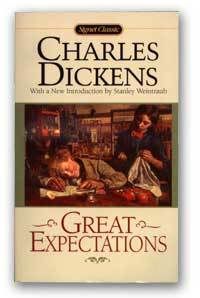
I had to read this book in high school and remembered NOTHING about it other than there was a boy named Pip and something about a convict and an old lady, that's it. I can't remember ever having read any other Dickens novel either other than "A Christmas Carol", but that's not saying much, considering my memory, and so I don't know if this sort of writing is his...forte' or modus operandi or something. Meaning, I found the book to be very formulaic. Is it that I am a 21st century jaded person? Possibly. But when I can predict everything that happened (and no, not because I remembered, because I truly did not), then I consider it formulaic. This books give meaning to "It's a Small World After All."
Everyone knows everyone else. Pip's encounters, over and over and over, are with the same tight-knit group of people; lawyers, clerks, rich crazy old ladies, cold beautiful girls, annoying town folk, escaped convicts. Really, how small is the England of old I think my main problem with the story is that I found no sympathy for Pip. Yes, at first, you feel sorry for him with his over-the-top sister who treats him and her husband Joe like the bane of her existence. She is mean, she puts on airs and she was a nag. You feel his terror at having met a convict and being threatened with death if he does not feed the convict. Joe and Pip had my sympathy, but then I start to notice a change in him when, by request, he goes to visit Miss Havisham, a rich eccentric lady who has not changed her clothes or cleaned her room since she was left at the alter on her wedding day by a swindler who took her money and broke her heart. After visiting her dilapidated mansion and meeting her beautiful ward Estella, he hates his gruff hands, he's embarrassed by his small house, by his mean clothing and mostly by Joe, his brother-in-law and best friend who has been nothing but wonderful to him. When Pip receives his "windfall" and is to have "Great Expectations" from an anonymous benefactor, he just becomes this insufferable fool and snob. He looks down on his town, he looks down on Joe and their nursemaid Biddy, who takes care of his sister who has been incapacitated by an intruder.
Pip journeys to London thinking Miss Havisham is his benefactor and just.....spends money and becomes more of a snob. He, never having anything in his life, is in debt now. His spending is out of control. He is sent to Mr. Pocket, Miss Havisham's relative, to get educated and become a gentlemen. His scant visits home involve him completely ignoring Joe, Joe's wife (his sister), his good friend Biddy and being condescending to the town folk. In London, he meets a lovely character named Wemmick who is ALL BUSINESS at work with a lawyer, who happens to be Miss Havisham's lawyer, and at home is a wonderful, caring, eccentric man. Pip pines away for Estella who is just cold and calculating, having been brought up by the heart-broken Miss Havisham to BE cold and break men's hearts.
In the end, he finds out who his real benefactor is, and everyone ends up being acquainted to each other in some ridiculous form or another (this guy is her dad, and his partner broke the other woman's heart and this maid is really her mom and yada yada yada) and it's just a bit over the top.
Pip loses his fortune, has to go home with his tail between his legs and eventually gets a job with his best friend, who he secretly funded when he had money. He meets Estella again in the end, newly widowed, and you get the idea that maybe they will get together. This was not Dickens original ending. He wrote Estella remarried after being widowed and their having a chance meeting on the street. Pips remains alone. Critics and readers hated the ending and he was asked by his publishers to write a newer ending with a little bit of hope to it, which is what he wrote. I am sorry to the Dickens lovers out there, I did not like this one. One more off my Top 100 Classics to read.

0 comments from wacky fun peeps!:
Post a Comment